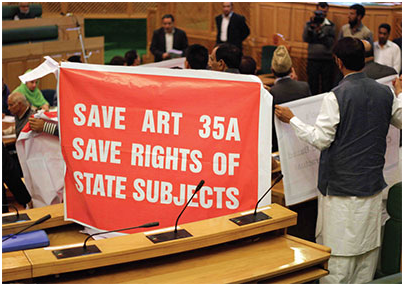JK Bar Council Lawyers To Monitor Petition Against Article 35A
Protest in JK Assembly

SRINAGAR: A day after the Jammu and Kashmir government filed objections to the petition challenging Article 35A, Jammu and Kashmir High Court Bar Association has deputed a team of lawyers to the Supreme Court to report about the developments in the case.
“We have deputed senior lawyers, Zaffar Qureshi and MS Reshi, to get copy of the objections filed by the state government and a copy of the response if filed by the Government of India. We are closely monitoring the case,” High Court Bar Association president, Mian Abdul Qayoom, said.
The Bar president said the petition is an attempt to do away with a constitutionally-settled position on the relation between India and J&K which is "not permissible under law", "Article 370 and Article 35A are basic features of Indian Constitution, and the constitutional arrangement between two states, and are, therefore, untouchable," he said.
The petition, filed by RSS-backed think-tank, J&K Study Centre, has challenged the constitutional validity of Article 35 A in the Indian Constitution and sought to do away with the special rights that debar a non-state subject from purchasing land or immovable property, seek a government job or vote in the assembly elections in the state.
The registrar of the apex court Thursday ordered listing of the case before a bench which is expected to come up for hearing anytime. On November 3, the court has ordered the Centre and J&K government to file objections to the petition till December 3. The Centre has so far failed to file its response.
A senior officer in J&K's law department said the state government has invoked special status provided to J&K under the Indian Constitution, the 1952-Delhi Agreement, constitutional bench judgments of the Supreme Court and powers vested with President, for issuance of the 1954 constitutional order, which has been termed as "illegal" by the J&K Study Centre.
“J&K had not acceded to either India or Pakistan but owing to tribal invasions the Maharaja signed instrument of accession with certain conditions that were accepted by Governor General of India. The immediate object of the accession, unlike other princely states, therefore was to make possible and legitimise deployment of troops to the state,” the JK government said in its response.
Invoking Clauses 4 and 7 of the Instrument of Accession and the communication whereby the Governor General of India had accepted the accession, the JK government pleads in its response that the accession must not be treated at par with accessions by other princely states after the partition.
The J&K Study Centre's petition has sparked anguish and concern in mainstream political parties, separatist groups as well as civil society gatherings, especially against the backdrop of the rise of the BJP whose stated objective in J&K is to revoke the Article 370 of Indian Constitution.
The Centre will hold centenary celebrations in January of the "literary and spiritual contributions" of Abhinavagupta, a Shaivite philosopher from Kashmir who is believed to have passed away on January 4, 1016.
“It would be a true homage to Acharya Abhinavgupta to enlighten the whole world, especially the youth of Kashmir, with the life and deeds of the legend who interpreted the ancient spiritual and cultural heritage of Kashmir in a new unifying philosophy with the challenges of times, in this era of ideological fanaticism,” RSS general secretary Suresh Joshi said in a statement:
“In January, exactly 1000 years after the date he merged himself in Shiva after retiring to a cave near Srinagar, we will have events dedicated to his memory in Delhi and Mumbai and will also have a seminar in Srinagar later in the year,” the J&K Study Centre's general secretary, Ashutosh Bhatnagar, said.



